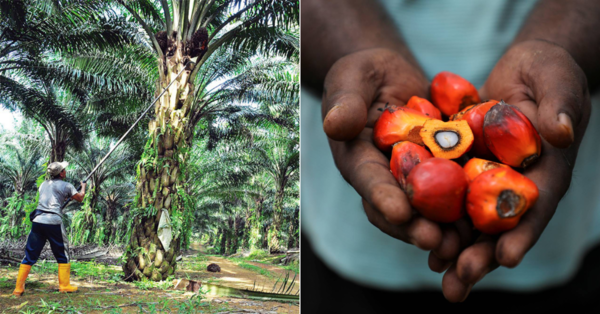Follow us on Instagram, TikTok, and Telegram for the latest stories and breaking news.
To demonstrate their commitment towards the production of sustainable palm oil, the Malaysian government announced in May 2017 the mandatory implementation of the Malaysian Sustainable Palm Oil (MSPO) Certification Scheme beginning 1 January 2020
Image via Wikipedia
This means that all oil palm plantations, organised smallholdings, and palm oil mills must be certified according to the requirements of the MSPO Standards by the aforementioned date. This is to offer concrete assurance to palm oil producers, importers, and consumers of a credible sustainable value chain, from production to consumption.
Established in December 2014, the Malaysian Palm Oil Certification Council (MPOCC) is an independent non-profit organisation that is responsible for the MSPO. Their duties include development of certification standards and scheme documents, training auditors, notification of accredited certification bodies, issuance of MSPO logo usage licenses, and handling complaints.
Here’s a look at the Five Principles of MSPO:
– Principle 1: Management commitment and responsibility
– Principle 2: Transparency
– Principle 3: Compliance to legal and other requirements
– Principle 4: Responsibility to social, health, safety, and employment conditions
– Principle 5: Environment, natural resources, biodiversity, and ecosystem services
The first version of the MSPO standards underwent a multi-stakeholder review process from 2019 to 2021, after which the revised MSPO standards were launched in March 2022
Image via Reuters / The Japan Times
In order to be in line with global sustainability norms, the MSPO 2022 standards have improved and strengthened the environmental, social, and economic requirements.
The scope of the eight parts of the MSPO 2022 standards:
– Part 1: General Principles
– Part 2-1: General Principles for Independent Smallholders (less than 40.46 hectares)
– Part 2-2: General Principles for Organised Smallholders (less than 40.46 hectares)
– Part 3-1: General Principles for Oil Palm Plantations (40.46 hectares to 500 hectares)
– Part 3-2: General Principles for Oil Palm Plantations (more than 500 hectares)
– Part 4-1: General Principles for Palm Oil Mill Including Supply Chain Requirements
– Part 4-2: General Principles for Palm Oil Processing Facilities Including Supply Chain Requirements
– Part 4-3: General Principles for Dealers Including Supply Chain Requirements
Besides certification requirements for smallholders, plantations, and mills, it now also includes requirements for processing facilities and dealers to become certified and part of the MSPO traceability.
In addition to global sustainability requirements, MSPO also considered its applicability to the Malaysian palm oil industry
Image via Hasnoor Hussain / Reuters
Requirements such as the United Nation Sustainable Development Goals (UNSDG) were considered and incorporated. As a result, High Conservation Value (HCV), which addresses environmental and social aspects that should be conserved, was included.
Besides that, a cut-off date of 31 December 2019 was introduced to discourage natural forests, protected areas, and HCV areas from being converted into oil palm plantations.
The MSPO 2022 standards also highlight the ILO Forced labour indicators and prohibits any forms of discrimination in the palm oil industry. Other social requirements that were strengthened are the prohibition of child labour, the introduction of decent living conditions, and avoidance of triangular employment.
As Malaysia continues on the journey towards full implementation of the MSPO certification, MPOCC will also be promoting the benefits of MSPO-certified palm oil to major importing markets
Image via The Malaysian Reserve
As a long-term measure, they will continue strengthening the principles and criteria of the MSPO standards to reflect evolving international best practices.
In order to continue improving the Malaysian palm oil industry and make it sustainable, the Malaysian Palm Oil Certification Council (MPOCC) welcomes any ideas or collaborations from interested parties.
Check out MPOCC’s website for more information.



